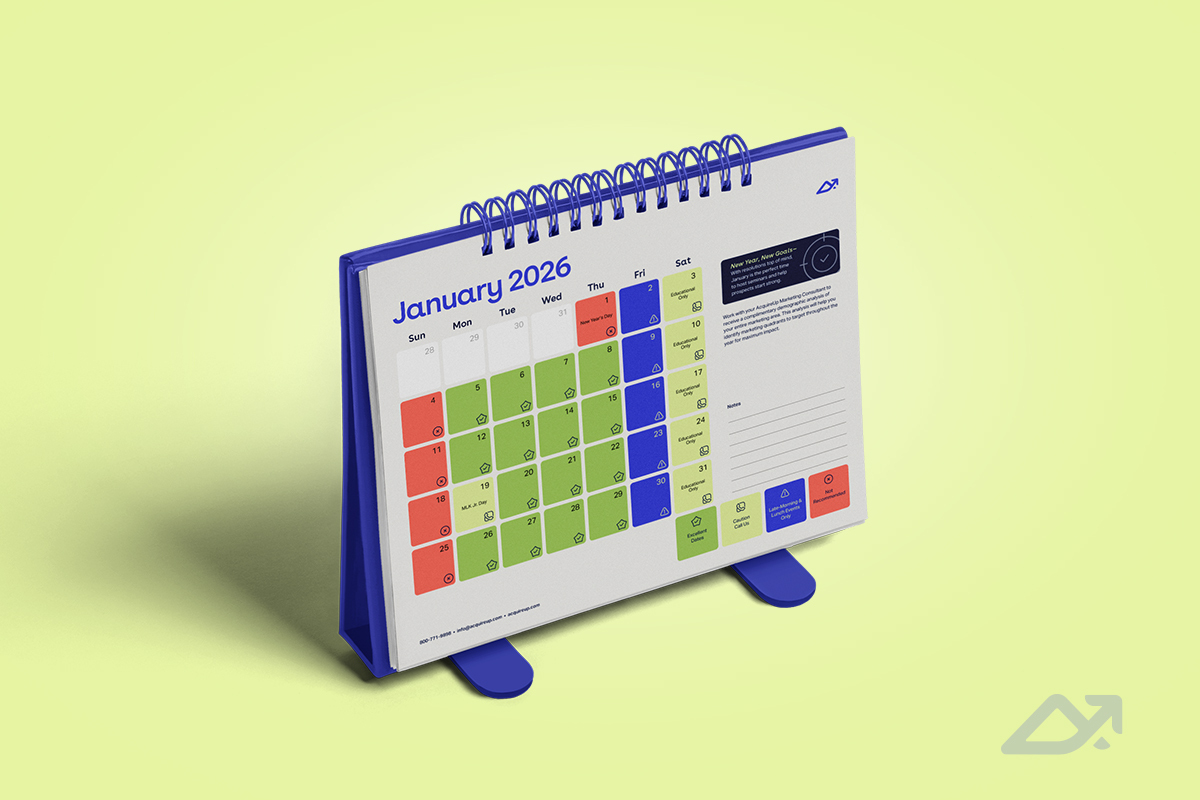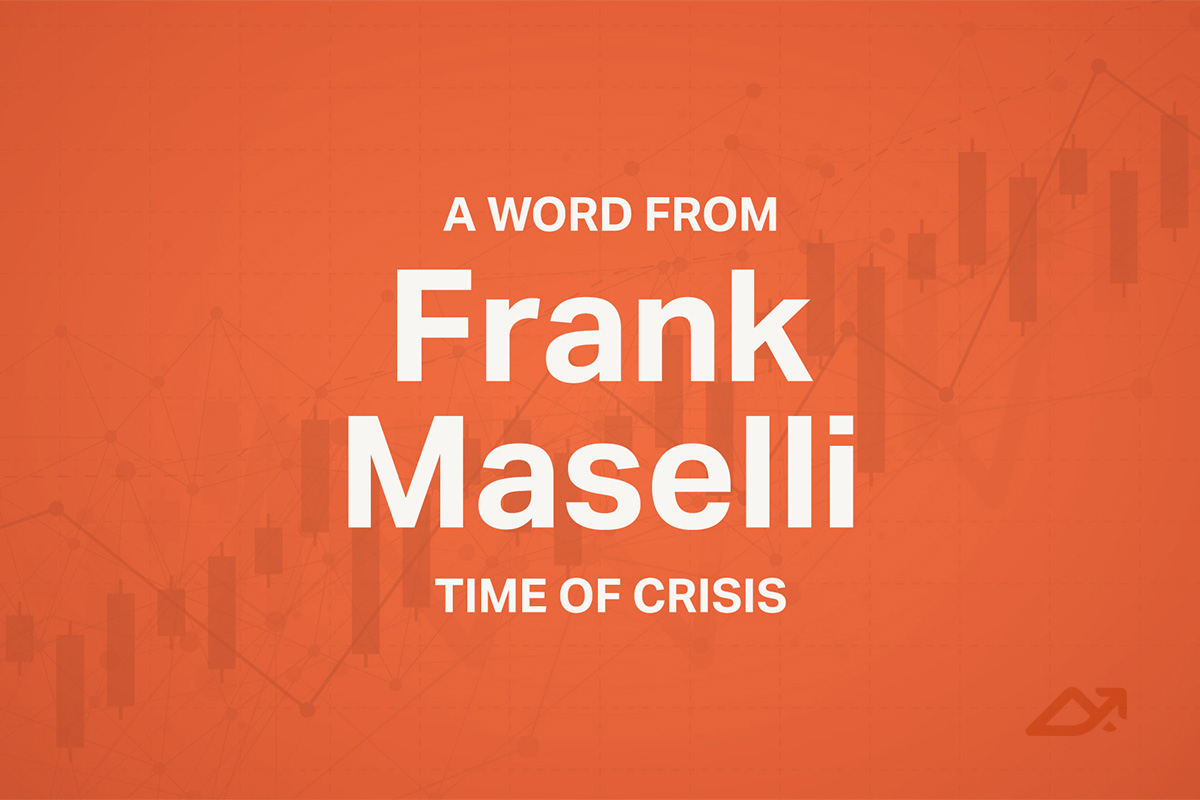Summary
Start your Q1 seminar planning now. With at least a five-week lead time required for success, financial advisors must begin strategic planning immediately to capitalize on New Year's resolutions and tax season opportunities. Learn how to build a winning strategy with targeted demographics, multi-channel marketing, and optimal event timing.
Key Points
- Q1 offers unique opportunities with New Year's resolutions and Tax Prep Season
- Minimum five-week planning lead time is critical for success
- Multi-channel marketing (direct mail + digital) drives better results
- Event timing and frequency should match your target demographics
- Strategic targeting and messaging significantly boost conversion rates
Why Is Q1 Your Golden Opportunity for Financial Advisor Seminars?
Q1 presents a unique window for financial professionals. New Year's resolutions are top of mind, and prospects are primed to focus on their financial futures. January offers the perfect backdrop for engaging prospects who want to start strong, while the months that follow provide momentum for sustained growth. Tax Prep Season in March and April also creates an ideal opportunity, as prospects are already thinking about their finances and considering tax-smart retirement and wealth planning strategies.
What Is the Five-Week Planning Rule for Seminars and Why Does It Matter?
Success in seminars means planning at least five weeks before your first event date. If you want to launch seminars in early January, your planning should be underway now. This timeline allows you to:
- Develop a comprehensive marketing strategy with your AcquireUp Marketing Consultant
- Identify and refine your target audience demographics
- Design effective direct mail and digital campaigns
- Select optimal dates and venues
- Create compelling messaging that resonates with your prospects
- Gain the necessary approvals from your Compliance Department
Waiting until December to plan your January events is a recipe for missed opportunities and reactive decision-making. Early planning allows you to be strategic and intentional.
How to Build an Effective Q1 Seminar Strategy: Key Elements
A solid Q1 plan hinges on several key elements:
Choose the Right Frequency and Timing
Research shows that Mondays, Tuesdays, Wednesdays, and Thursdays deliver optimal attendance. Consider your target demographic carefully—prospects under 62 often struggle to attend midday events due to work commitments. If your audience includes working professionals or younger retirees, plan at least one dinner event alongside lunch options. Offering multiple event times and dates within a single campaign dramatically increases your reach and attendance rates.
Leverage Multiple Marketing Channels
Don't rely on a single approach. Combine direct mail with digital marketing through email, social ads, and retargeting. Fresh, engaging content is critical; avoid mailing the same offer to prospects more than once every 60-90 days to prevent audience fatigue. A multi-channel approach keeps your brand top of mind and significantly boosts conversion likelihood.
Best practices for multi-channel marketing:
- Email marketing campaigns
Focus on Compelling Messaging
Direct mail campaigns perform best with formal, wedding-style invitations that include a personal touch. Craft a compelling message and highlight your bio to connect with motivated prospects. The right tone can significantly boost your response rates and set the stage for meaningful conversations with high-intent prospects.
Target Smart, Not Broad
Top producers refine their audience using asset levels, household income, or a combination of criteria. Ask about identifying fresh, unmailed prospects—an untapped audience who hasn't yet been exposed to your message. This precision targeting maximizes your ROI and ensures your message reaches the right people.
What Seminar Topics Resonate Best in Q1 for Financial Advisors?
January kicks off with New Year momentum. Prospects are ready to establish new financial habits and make strategic moves. Consider hosting seminars on topics like:
- Social Security optimization
- General Retirement Planning
- IRA Holders and Roth Conversions
- Wealth Management strategies
- Estate Planning (for March/April)
As you move into March and April's Tax Prep Season, pivot to tax-smart retirement strategies and estate planning topics that capitalize on prospects' heightened financial awareness.
How Should Financial Advisors Use the 2026 Seminar Planning Calendar?
The 2026 Seminar Planning Calendar is an essential tool for your Q1 planning. This resource provides:
- Color-coded date recommendations - Identify "Excellent Dates," dates to use caution with, and dates marked as "Not Recommended" for each month
- Holiday and event awareness - See which holidays and observances fall in Q1 so you can plan around them strategically
- Month-specific insights - Each month includes targeted messaging about seasonal opportunities (like "New Year, New Goals" in January and "Tax Prep Season" in March)
- Best practices and tips - Each page features actionable guidance on everything from demographic targeting to multi-channel marketing strategies
- Performance-based campaign topics - See which seminar topics resonate best throughout the year
Use this calendar as your planning guide. Reference the January and February pages to identify your ideal event dates, then cross-check against the recommended timing to ensure maximum attendance and impact.
How Can Financial Advisors Partner with Marketing Consultants for Q1 Planning?
This is where professional expertise makes all the difference. Partner with an AcquireUp Marketing Consultant to map out a long-term strategy tailored to your goals and budget. They'll help you:
- Receive a complimentary demographic analysis of your entire marketing area
- Identify which marketing quadrants to target for maximum impact
- Determine whether monthly seminars, quarterly events, or seasonal timing best aligns with your objectives
- Build omni-channel marketing campaigns for maximum reach
- Leverage the 2026 Seminar Planning Calendar to select optimal dates and align your messaging with seasonal opportunities
Why Start Q1 Seminar Planning Now? Key Takeaways
Q1 offers tremendous potential for financial advisors willing to plan strategically and execute consistently. The seminars you launch in January, February, and March can set the tone for your entire year. Seminar marketing is one of the most effective ways to fill your pipeline with high-intent prospects—nearly 20% of clients find their advisors through educational events, according to the Kitces 2024 Marketing Survey.
But success depends on one often-overlooked element: creating a long-term strategy with proper planning timelines. Don't let Q1 slip away by waiting too long. Start your planning today, and you'll be positioned to deliver both immediate results and sustained growth throughout the year.




.png)
.png)

.jpg)

.jpg)
.png)


























